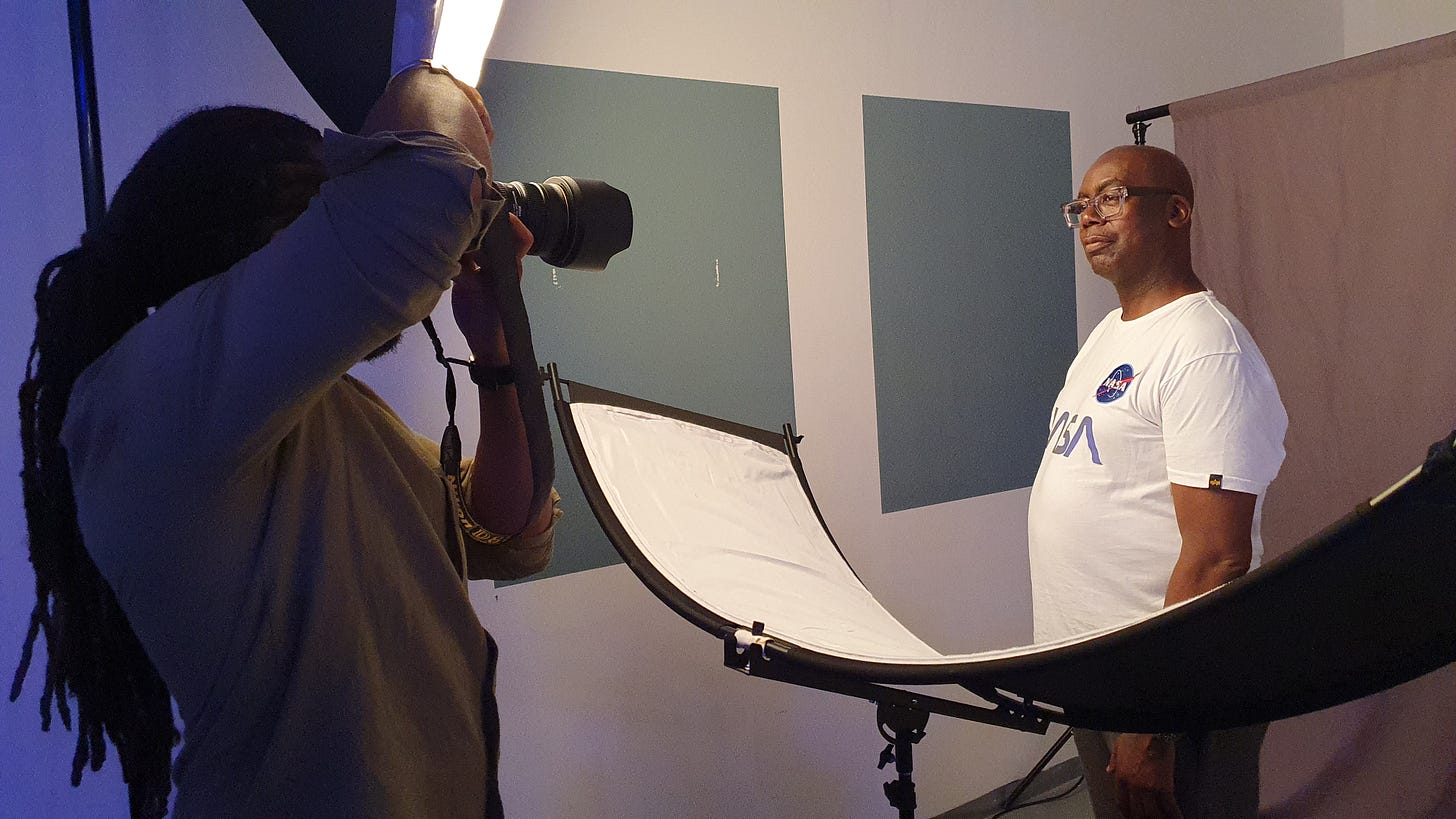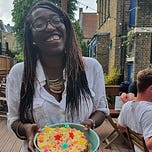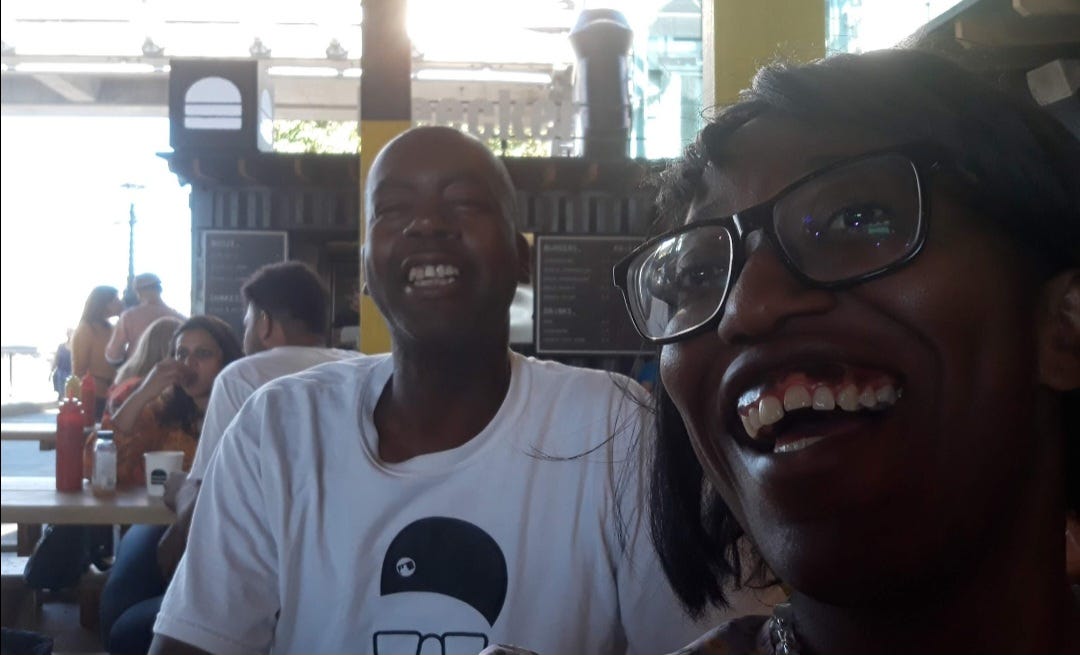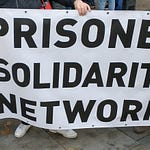Hope you enjoyed last week's episode "What Is Prison For?" with Chris Akers from 286 Project.
This week I'm interviewing Afrofuturist Patrick Vernon who runs his own social enterprise promoting the history of diverse communities, as founder of Every Generation and the "100 Great Black Britons" campaign and ran a successful campaign for 22 June to be recognized annually as Windrush Day, a National day acknowledging the migrant contribution to UK society. I filmed this interview a few years ago at Southbank centre. With activism and black liberation still the fulcrum of what gets the UK chatting, it still feels as relevant as ever...
However I have had a Damascene conversion since episode one and the podcast has had a name change!
From today onwards it's called Chat Shit, Get Banged. Not because I want to trip anyone up, but because it gives me room for manoeuvre to interview whoever the hell I want. So peoples who's politics I might not align with but by virtue of their careers may have something interesting to say nonetheless.
But if they chat shit, they get banged.
Chat Shit, Get Banged is on Tik tok and Twitter
Patrick Vernon OBE’s work in black mental health has been ongoing for over 20 years. He was a committee member of Healthwatch England, advisory board member for Time To Change, and former ministerial adviser for mental health. He was also a member of the Independent Metropolitan Police inquiry on Mental Health and Policing and became the first director of Black Thrive, a multi-agency tackling mental health in Lambeth, until September 2018.
Patrick’s storied career as a pundit, public intellectual and the founder of 100 Great Black Britons is awe inspiring. Yet it is his lesser-known contribution to the field of black mental health that enshrines him as a cultural and liberation leader in the black community. Here, I highlight excerpts from his more obscure writings, written with the aim of uplifting black people and catalysing our liberation, which he considers one of the main ways to provide self esteem and thus good mental health.
In March 2014, Patrick wrote ‘The Price Tag on Slavery is Beyond Pounds and Dollars’. This article discusses CARICOM, an organisation that represents fifteen Caribbean countries, and the legal action it is pursuing against eight European countries, to gain reparations for the suffering inflicted by the Atlantic slave trade. As Patrick states:
‘In the UK these discourses may be greeted with a degree of scepticism and criticism of “political correctness gone mad”. Media, politicians and the public often perceive the idea of reparation or restorative justice as unreasonable considering the offending actions are not a feature of modern Britain. However, if you look at family genealogies in the UK there remains a strong shared and collective history of slavery and colonisation of black ancestors by white ancestors.’
As a black OBE who is public-facing—thus prone to attacks from the press and others—talking about Britain’s history with colonialism and reparations is bold.

Patrick’s next article was published in January 2015, entitled Black Lives Matter: International Decade for People of African Descent. The text is a rallying cry to all oppressed peoples of African descent around the world:
‘With the ongoing state police killing of black youth, men and women in the USA; Ebola, climate change, and Islamic led terrorism in Africa; fragile economies of the Caribbean; and growing health, economic and political social inequality in the UK and mainland Europe we are starting to feel like an endangered species!!!’
The article discussed the United Nations’ newly announced plan to focus on International Decade for People of African Descent (2015-24) and the themes of recognition, justice and development. I have since heard little about this initiative from the United Nations itself, but simply by writing this article, Patrick put people of African descent at the foreground of his politics and the public discourse.
His article concludes with some suggestions on a way forward:
‘We thus need to shape and develop new tools and approaches based on lessons of survivorship and resilience for the next century, not only for people of African descent living in the West but also on the continent. What is clear from the USA Afrofuturism movement, the Black Lives Matter campaign, and in the UK’s Exhibit B campaign is that women are taking the lead in using arts, social movement theory and creativity to establish new understanding and spaces. We have a lot of talent and interesting perspectives that we can shape based on a Afrofuturist approach in the UK to issues affecting the community as reflected in the UN declaration for the Decade for People of African descent.
We need to translate this in a UK context for a future government post the 2015 General Election to take on board the need for recognition, justice and development as part of the UN decade for the Black community in Britain. I believe that we need to adopt an action plan around affirmation action in the short to medium term. Also we need to develop a social movement around reparations, repairing the harm around the legacy of enslavement and modern day structural racism.’
In February 2016, Patrick took part in the inaugural Bare Lit Festival run by and for people of colour. In his post-festival round-up for Media Diversified, ‘Bare Lit Festival: Building a Community’, he honoured all the festival’s participants for their broad vision, mentioning his own panel on afrofuturism and historical fantasy fiction, ‘(Re)writing Pasts and Futures’. Literature can and does shape black peoples’ political and social progress. Writing us into the future is a revolutionary act. Patrick has encouraged black people to do this over decades: for example, on his radio show Museum of Groves (Rebel Radio), he has interviewed people from Courttia Newland to Alex Wheatle, while highlighting exactly why literature by black people is important as both historical documentation and an access point to liberation praxis for audiences around the world.
In Patrick’s searing article, ‘Where are all the black historians?’, he gives the background to his organisation, 100 Great Black Britons, and books When We Ruled, Caribbean in Sepia and Masters of the Airwaves. e also discusses the BBC Radio 4 programme Making History, which tried to address the lack of black historians in the UK. Patrick focuses on Hakim Adi, who was until recently the only black professor of history in the UK. Thankfully, with the appointment of Olivette Otele as a Professor of History at Bath University Spa in 2018, that is no longer the case.
Patrick’s 2016 article describes how Hakim contacted the Radio 4 producer to suggest his own inclusion in the programme. He highlights the History Matters conference in March 2015, which Hakim co-organised to focus on the lack of black historians in higher education. It appears Hakim had to make the case to be on the programme, which is rather ironic considering his standing and track record. Patrick explains how the Radio 4 Making History programme had a golden opportunity to explore the factors and barriers that have historically disenfranchised black historians.The programme, Patrick says, could have examined the wider debate on the national curriculum and campaigns such as ‘Why is My Curriculum White?’ or ‘Rhodes Must Fall’. It failed miserably as it featured white historian after white historian explaining the barriers to black people’s socio-economic progress in the UK.
Patrick made the point—obvious to us, but not to Radio 4—that:
‘Black historians’ activism over the decades has also influenced universities and funding bodies thinking of diasporic communities and the black British experience and its relationship with Empire; however, in 2016 the majority of research in universities on these topics is led by white scholars.’
Patrick ends, as always, by giving some suggestions:
‘To address the issue of under representation of black historians we need an affirmative action programme similar to that in the USA to increase the number of black historians at universities. There must also be more flexibility in Heritage Lottery Funding, Arts Council and research bodies to support and encourage independent black scholars and historians who are providing a public service in the education and learning of young people within black communities, but outside them as well.’
In April 2016, Patrick wrote an article about J A Rogers, a leading black historian. It was written on the occasion of the fiftieth anniversary of his death. Joel Augustus Rogers is little known or talked about in the UK. However, in Patrick’s words, he was ‘one of the most dynamic black historians and social commentators on modern times’. Over a 40 year period, Rogers, through his columns Your History and Ruminations in African American newspapers (including The Messenger, New York Amsterdam Times and Pittsburgh Courier) and his publications (Super to Man, 100 Amazing Facts of the Negro, Race and Sex, World’s Greatest Men of Colour, The Five Negro Presidents), made black history a popular subject of interest in America.
Patrick’s may have decided to celebrate Roger’s life because Roger mirrors some of Patrick’s own work—Rogers was also an entrepreneur who self-published 25 books, which were read by millions of African Americans as well as people from Africa and the Caribbean. Patrick makes the point that Rogers was an autodidact—he never went to university—and over the course of years he ‘taught himself French, German, Spanish along with European and African history’. That is no mean feat, and an oft-found phenomena in BME working class households who don’t have the same access to institutional resources as their white and middle class peers.
Ahead of the May 2017 election, Patrick co-wrote an article entitled, ‘Turn Up and Turn Out: why you should vote in the General Election’. This collaborative effort helped to build bridges across generations, as older people at his time had been accused of destroying the future for young people, when in fact black working class people voted overwhelmingly to remain in the European Union. In his words:
‘The right to vote is one of the few ways that we can exercise our democratic voice. The long struggle from the Magna Carta to emancipation and the fight for equalities should remind us we need to use this power if we want democracy to tackle social justice and inequality in society. I believe this General Election is the most critical in the last 30 years. We now have a clear choice in terms of politics and ideology. You need to register and vote. If people want to complain after June 8th that they can’t get a home, that they are on a zero hours contract, that they have less money or less rights, or that they need proof of citizenship to access privatized public services… Please don’t bother talking to me.’
In October 2017, he announced that 100 Great Black Britons was relaunching for 2017. The goal was to update the list by asking for nominations from the public. The new list of Great Black Britons was announced in October 2018. Patrick’s article explains that he founded the project in 2002 to give visible role models to young people when, at the time, they were not included in the school curriculum or were being written out of public history. He explains:
‘The [initial] project was based on my experience as volunteer mentor working with African and Caribbean boys and young men in Brent and Hackney who were either on the verge of being excluded from school or had low self-esteem in finding work… [It was a] response to the BBC’s 100 Britons campaign in 2002, which saw the public voting for Winston Churchill as the greatest Brit of all time. Not one person of African heritage was included... I hope that through raising awareness we can change the conversation about the contributions of black people to British society and history, and protect their legacy.’
As part of his campaign to establish a national Windrush Day alongside faith leaders, activists, trade unions, politicians, celebrities, community organisations and individuals, he wrote an article entitled ‘Windrush and migration stories must become part of a national narrative of Britain’. The piece is a personal plea to the Conservative government:
‘It is disappointing that the announcement by the government did not recognise the symbolism that Windrush Day could have to recognise the wider contribution of all migrants, especially in the context of a hostile immigration environment. I hope Theresa May will now also consider that if we have a Windrush Day then we can now abolish the hostile immigration policy which will taint and jar with celebrating the Windrush Generation and migration.’
One of the reasons I chose to honour Patrick in the Black Cultural Activism Mapis because of his support of BME-run independent publishing platforms. Whilst he does write for The Guardian he also writes for small independents for little or no remuneration because he wants to speak directly to people of colour.
It is hard to quantify how important it is to have an unapologetic black man at the helm of all these initiatives, and particularly those involving mental health. So often we as black people are over-policed and under-diagnosed in terms of mental health. His mission to show us as multi-faced, complex people—whilst seemingly obvious—has gradually led to better outcomes for our most vulnerable. There is more work to do, as always, but Patrick Vernon OBE is the right person, with experience and sensitivity, to do it.
This essay was originally commissioned by The Stuart Hall Foundation in 2018.
P.S I know there is going to be some non-black women and/or middle class women who try to take my experiences and use them as their own. Trust me, I will hunt you down if you do and you will catch these hands.














Patrick Vernon: The Afrofuturist